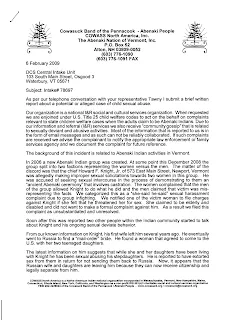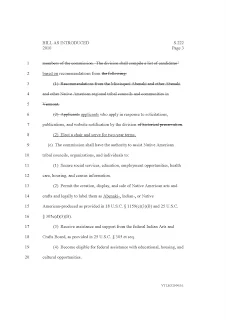BILL AS INTRODUCED S.222
2010 Page 1
VT LEG 250410.1
1 S.222
2 Introduced by Senators Miller, Snelling and Carris
3 Referred to Committee on
4 Date:
5 Subject: Abenaki people; recognition; Vermont commission on Native
6 American affairs
7 Statement of purpose: This bill proposes to recognize the following tribes as
8 the original Western Abenaki Indian tribes residing in Vermont: the Abenaki
9 Nation of Missisquoi St. Francis Sokoki Band, composed of the Missisquoi,
10 St. Francis, and Sokoki Bands; the Koasek Traditional Band of the Koas
11 Abenaki Nation; the Nulhegan Band of the Abenaki Nation, also known as the
12 Northern Coosuk/Old Philip’s Band; and the ELNU Abenaki Tribe of the
13 Koasek. The bill also proposes to amend the composition of the Vermont
14 commission on Native American affairs, and to adopt the United Nations
15 Declaration on the Rights of Indigenous Peoples.
16 An act relating to recognition of Abenaki tribes
17 It is hereby enacted by the General Assembly of the State of Vermont:
BILL AS INTRODUCED S.222
2010 Page 2
VT LEG 250410.1
Sec. 1. 1 V.S.A. 1 § 852 is amended to read:
2 § 852. VERMONT COMMISSION ON NATIVE AMERICAN AFFAIRS
3 ESTABLISHED; AUTHORITY
4 (a) In order to recognize the historic and cultural contributions of Native
5 Americans to Vermont, to protect and strengthen their heritage, and to address
6 their needs in state policy, programs, and actions, there is hereby established
7 the Vermont commission on Native American affairs (the “commission”).
8 (b) The commission shall comprise:
9 (1) Be composed of the following seven members:
10 (A) Three members appointed by the Abenaki Nation of Missisquoi,
11 St. Francis Sokoki Band having been composed of the three Missisquoi bands.
12 (B) One member appointed by the Koasek Traditional Band of the
13 Koas Abenaki Nation.
14 (C) One member appointed by the Nulhegan Band of the Abenaki
15 Nation.
16 (D) One member appointed by the ELNU Abenaki Tribe of the
17 Koasek.
18 (E) One member appointed by the governor for two-year terms other
19 six commission members from a list of candidates compiled by the division for
20 historic preservation. The governor shall appoint a chair from among the
BILL AS INTRODUCED S.222
2010 Page 3
VT LEG 250410.1
members of the commission. The division shall compile 1 a list of candidates’
2 based on recommendations from the following:
3 (1) Recommendations from the Missisquoi Abenaki and other Abenaki
4 and other Native American regional tribal councils and communities in
5 Vermont.
6 (2) Applicants applicants who apply in response to solicitations,
7 publications, and website notification by the division of historical preservation.
8 (2) Elect a chair and serve for two-year terms.
9 (c) The commission shall have the authority to assist Native American
10 tribal councils, organizations, and individuals to:
11 (1) Secure social services, education, employment opportunities, health
12 care, housing, and census information.
13 (2) Permit the creation, display, and sale of Native American arts and
14 crafts and legally to label them as Abenaki-, Indian-, or Native
15 American-produced as provided in 18 U.S.C. § 1159(c)(3)(B) and 25 U.S.C.
16 § 305e(d)(3)(B).
17 (3) Receive assistance and support from the federal Indian Arts and
18 Crafts Board, as provided in 25 U.S.C. § 305 et seq.
19 (4) Become eligible for federal assistance with educational, housing, and
20 cultural opportunities.
BILL AS INTRODUCED S.222
2010 Page 4
VT LEG 250410.1
(5) Establish and continue programs 1 offered through the U.S.
2 Department of Education Office on Indian Education pursuant to Title VII of
3 the Elementary and Secondary Education Act established in 1972 to support
4 educational and cultural efforts of tribal entities that have been either state or
5 federally recognized.
6 (6) Consult with the Abenaki Nation of Missisquoi, St. Francis Sokoki
7 Band; the Koasek Traditional Band of the Koas Abenaki Nation; the Nulhegan
8 Band of the Abenaki Nation; and the ELNU Abenaki Tribe of the Koasek in
9 determining state policy and programs on issues affecting indigenous peoples
10 within the state of Vermont.
11 (d) The commission shall meet at least three times a year and at any other
12 times at the request of the chair. The agency of commerce and community
13 development and the department of education shall provide administrative
14 support to the commission.
15 (e) The commission may seek and receive funding from federal and other
16 sources to assist with its work.
17 Sec. 2. 1 V.S.A. § 853 is amended to read:
18 § 853. RECOGNITION OF ABENAKI PEOPLE
19 (a) The state of Vermont recognizes the Abenaki people and recognizes all
20 Native American people who reside in Vermont as a minority population.
BILL AS INTRODUCED S.222
2010 Page 5
VT LEG 250410.1
(b) Recognition of the Native American or 1 Abenaki people provided in
2 subsection (a) of this section shall be for the sole purposes specified in
3 subsection 852(c) of this title and shall not be interpreted to provide any Native
4 American or Abenaki person with any other special rights or privileges that the
5 state does not confer on or grant to other state residents.
6 (c) This chapter shall not be construed to recognize, create, extend, or form
7 the basis of any right or claim to land or real estate in Vermont for the Abenaki
8 people or any Abenaki individual and shall be construed to confer only those
9 rights specifically described in this chapter.
10 (d) The state of Vermont adopts the United Nations Declaration on the
11 Rights of Indigenous Peoples, which gives indigenous people the right to
12 self-determination and to freely practice traditions and customs without
13 discrimination.
14 (e) The state of Vermont recognizes the Abenaki Nation of Missisquoi,
15 St. Francis Sokoki Band, which is composed of the former Missisquoi, St.
16 Francis, and Sokoki Bands; the Koasek Traditional Band of the Koas Abenaki
17 Nation; the Nulhegan Band of the Abenaki Nation, also known as the Northern
18 Coosuk/Old Philip’s Band; and the ELNU Abenaki Tribe of the Koasek as the
19 original sovereign Western Abenaki Indian tribes residing in Vermont.
20 (f) The Vermont commission on Native American affairs shall recommend
21 to the general assembly that the state of Vermont recognize any tribe not
BILL AS INTRODUCED S.222
2010 Page 6
VT LEG 250410.1
identified in subsection (e) of this section, provided 1 the tribe demonstrates
2 compliance with all the following:
3 (1) Has a tribal council, a constitution, and a chief.
4 (2) Owns land in Vermont or provides historic records that document
5 that the tribe has had an historic presence in Vermont.
6 (3) Is recognized by other Native American communities.
NO GENEALOGICAL EVIDENCE OF ANY OF THESE GROUPS BEING CONNECTED TO THE ABENAKI PEOPLE IS REQUIRED (?).
Apparently, no one in the Legislature bothered to review and evaluate the BIA Report Conclusion regarding the "group" up in Swanton, Vermont which is led by April St. Francis-Merrill.
WHY NOT?! Is the Legislative Representative's so stupidly blind, and foolish as to NOT investigate, review, and evaluate the genealogical, historical and social merits of these "groups" claiming to being Abenaki? Apparently, they could care less, if the State of Vermont gets hood-winked by a bunch of deceivers, liars, manipulators and imposters! Apparently, the State of Vermont would rather deal with FRAUDS, FAKES, and WANNABE'S rather than deal with legitimate bonefide documented real Abenaki descendants that have lived in Vermont for well over a hundred + years! Can anyone say (to name just a few) O'bomsawin, Watso, Benedict, Masta, Laurent, etc.?! These families were NOT "hiding in plain sight"! No, they were NOT. Nor were they in the Eugenics Program of Vermont, N.H., or Maine either! Yet, they were REAL Abenakis who were and are clearly documented throughout history and so on. THINK ABOUT IT.























